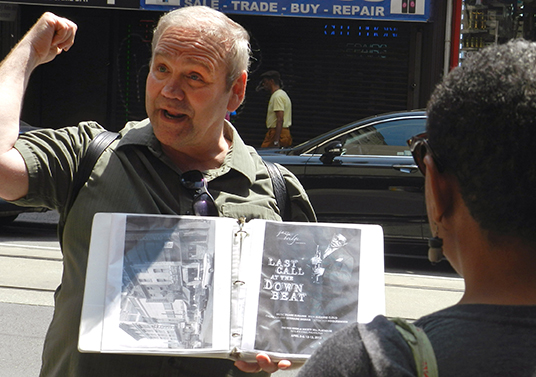Exploring the Philly Jazz Legacy on Jack McCarthy’s walking tour

Jack McCarthy | photo by Jennifer Brady | www.behance.net/JennBrady
Philadelphia International Records was never particularly tied to Philly’s jazz scene. Still, historian Jack McCarthy made it a point to stop at the legendary soul label’s Broad Street home when leading tours about the city’s jazz history. In part, that’s because many local jazz musicians picked up session work there when it housed the Cameo-Parkway label. And in part, it’s simply because it was so integral to local music history.
In April, when McCarthy led his inaugural “Exploring the Philly Jazz Legacy” tour, he showed tourists the Philadelphia International Records building itself; a month later, he showed his next group a block-long hole in the ground surrounded by a chain-link fence. In coming months, he’ll be showing tourists a photo of the now-demolished building while standing in front of a new 47-story hotel and condo tower. That story is indicative of the history of Philly jazz, where so many of the music’s former homes have been erased from the ever-changing landscape.
“That building wasn’t architecturally significant,” McCarthy says, “but there was such rich history there between Cameo-Parkway and Philadelphia International Records that it was sacred ground for Philly music. I’m not one of these preservationists that thinks everything should be saved and all developers are evil, but downtown is all about real estate and money, so if something’s historically significant but the market would be better served by having a modern building that makes a lot of money, that’s just a shame.”
McCarthy will be offering his next jazz-centered tour through Hidden City this Saturday, June 27th. The occasional strolls through local jazz history begin at the Convention Center and take visitors past the sites that once hosted some of jazz’s most legendary figures. Many of the stops require a bit of imagination aided by a binder full of historical photos that McCarthy carries along with him. The Earle Theatre, for instance, which once upon a time shook with the sounds of big bands led by the likes of Duke Ellington, Count Basie, and Cab Calloway, is now a CVS. The building on 11th Street where Dizzy Gillespie played a two-month engagement at the Downbeat club still stands, but it’s simply a blank window over an awning reading “E.R. Diamonds.”
The tour then travels down Broad Street, where McCarthy shows the buildings that housed or replaced famed jazz hotspots like Pep’s and the Showboat, the Royal Theatre on South Street (whose façade is now adorned with a mural featuring former headliners like Fats Waller and Bessie Smith) and Emerson’s Bar and Grill, immortalized in a Broadway show about Billie Holiday’s time there, “Lady Day at Emerson’s Bar and Grill,” soon to air on HBO. The tour ends at the Philadelphia Clef Club of Jazz and Performing Arts, where visitors are shown around the building’s classrooms and rehearsal areas, even getting impromptu performances from some of the students.
McCarthy does his best to bring the ghosts of Philly jazz past back to life. Dodging cars emerging from a parking garage, for instance, he relates the tale of young saxophonists John Coltrane and Benny Golson escorting their idol, Charlie Parker, from the Academy of Music to an after-hours jam session at the Downbeat. Gesturing across Chestnut Street to what is now Society Hill Furniture, he recalls the days when that same storefront housed Music City, a musical instrument shop that also hosted jam sessions on the third floor – and was the location where trumpet great Clifford Brown gave his last performance in 1956, just hours before his death in a car accident on the PA turnpike.

Jack McCarthy | photo by Jennifer Brady | www.behance.net/JennBrady
Many of these stories are also related in articles that McCarthy has penned for Hidden City’s website. A Philly native, McCarthy started out studying music at West Chester University and eventually earned a master’s degree in music history, bringing together his two passions. “I was drawn to the history of music,” he recalls, “plus I knew I wasn’t going to set the world on fire as a performer.”
McCarthy now works primarily as an archivist for the Historical Society of Pennsylvania while pursuing his fascination with local music history, serving as a consultant for the Philadelphia Orchestra’s 2012-13 Leopold Stokowski centennial and for the 2014 audio documentary “Going Black: The Legacy of Philly Soul Radio.” Along with the jazz tour, he also leads a walking tour for Hidden City on music in colonial Philadelphia.
“My history work is all about bringing hidden histories to light,” McCarthy says. “Every city has its own history, but I think Philly is in the first rank of cities in the United States in terms of music history. In certain periods Philly was one of the most important music cities in North America, and I just don’t think people are aware of that. It enriches the overall fabric of the community to know that embedded in all these physical places is a rich history that’s been going on for 300 years.”
- Philadelphia Clef Club – Rehersal Room | photo by Jennifer Brady | www.behance.net/JennBrady
- Broad & South Street | photo by Jennifer Brady | www.behance.net/JennBrady
- The Royal Theater | photo by Jennifer Brady | www.behance.net/JennBrady
- Jack McCarthy | photo by Jennifer Brady | www.behance.net/JennBrady
- Jack McCarthy | photo by Jennifer Brady | www.behance.net/JennBrady
- Site of the old Gamble & Huff | photo by Jennifer Brady | www.behance.net/JennBrady





